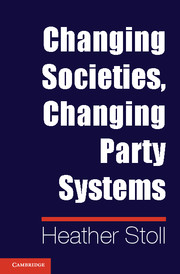Book contents
- Frontmatter
- Contents
- List of Tables
- List of Figures
- Acknowledgments
- 1 Introduction
- 2 Social Heterogeneity and the Number of Parties: A Theory
- 3 Describing Social Heterogeneity: Measures and Testable Hypotheses
- 4 Social Heterogeneity and Party System Fragmentation: Empirical Evidence across Space and Time
- 5 Israel: New Parties for New Groups?
- 6 Israel: Testing Hypotheses about Sectarian Party Success
- 7 The United States: New Parties for New Groups? Testing Hypotheses
- 8 Conclusion: Party System Fragmentation and Beyond
- A Additional Material for the Quantitative Analyses in Chapter 4
- B Demography in Israel
- C Sephardi and Russian Sectarian Parties and Their Success in Israel
- D Demography and the Franchise in the United States
- E African American Descriptive Representation in the United States
- Bibliography
- Index
1 - Introduction
Published online by Cambridge University Press: 05 June 2014
- Frontmatter
- Contents
- List of Tables
- List of Figures
- Acknowledgments
- 1 Introduction
- 2 Social Heterogeneity and the Number of Parties: A Theory
- 3 Describing Social Heterogeneity: Measures and Testable Hypotheses
- 4 Social Heterogeneity and Party System Fragmentation: Empirical Evidence across Space and Time
- 5 Israel: New Parties for New Groups?
- 6 Israel: Testing Hypotheses about Sectarian Party Success
- 7 The United States: New Parties for New Groups? Testing Hypotheses
- 8 Conclusion: Party System Fragmentation and Beyond
- A Additional Material for the Quantitative Analyses in Chapter 4
- B Demography in Israel
- C Sephardi and Russian Sectarian Parties and Their Success in Israel
- D Demography and the Franchise in the United States
- E African American Descriptive Representation in the United States
- Bibliography
- Index
Summary
Voice is “a basic portion and function of any political system”(Hirschman 1970, 30). But it is particularly important in political systems that aim for some sort of responsiveness of the government to its citizens—the type of political system that Dahl (1971) has called polyarchy, and that others have more commonly called democracy.
In his classic work, Dahl (1971) conceptualized voice as developing along two dimensions in democratic systems. The first dimension, contestation, concerns the extent to which opposition to the government is allowed. For example, are there free and fair elections for both the chief executive and the legislature? The second dimension, inclusion, concerns the proportion of the population that is allowed to participate in the contestation. For example, are women allowed to vote in elections? Another way of looking at this is that we should distinguish between how voice may be exercised (contestation) and who exercises it (inclusion). Voice in toto is ultimately shaped by both this “how” and this “who.”
Many scholars of democratization such as Alvarez and colleagues (1996) have focused heavily on the first of these dimensions of voice, which is institutional in nature. Yet even they have acknowledged the importance of the second of these dimensions, which is societal in nature. This societal dimension of voice may alternatively be conceptualized in terms of preferences. Just as the institutional framework for exercising voice varies, so too do the preferences that are its content.
- Type
- Chapter
- Information
- Changing Societies, Changing Party Systems , pp. 1 - 21Publisher: Cambridge University PressPrint publication year: 2013



